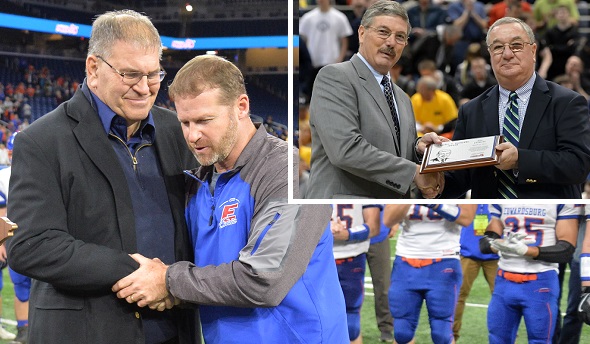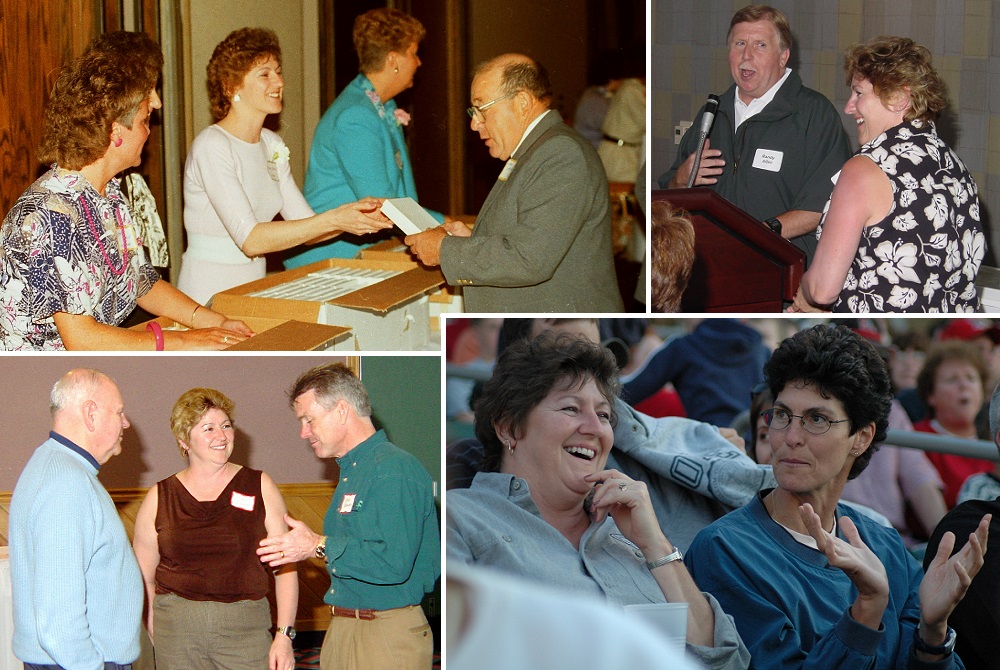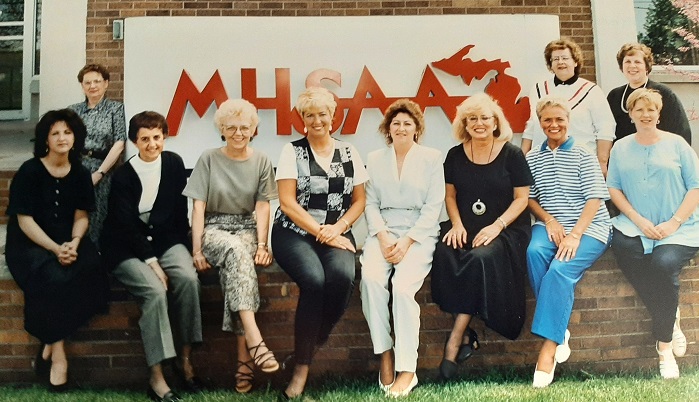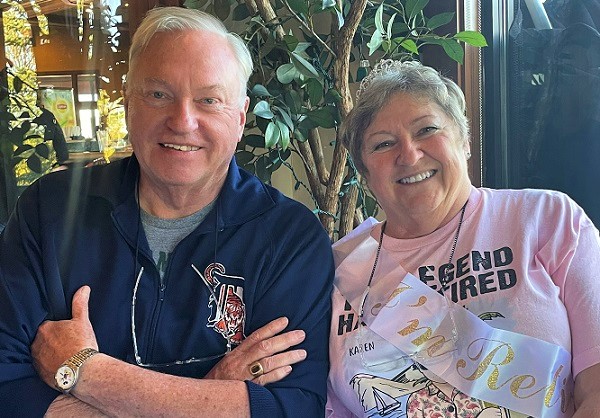
Forsythe Honorees Led with Statewide View
March 6, 2019
By Geoff Kimmerly
Second Half editor
Jim Derocher always tried to listen to everyone before making a decision while serving on the MHSAA's Representative Council. He wanted to best serve not just the stars but all student-athletes, and not just those down the road but all over Michigan.
Longtime Council member Fred Smith always thought back to something Lake Michigan Catholic coach Terry Rose once told him: when making decisions, do what's best for kids first. Smith did so while trying to consider the needs not just of the student-athletes in his community, but in the many communities all over the state.
Both Derocher and Smith served thousands of students locally over decades of service and provided statewide contributions that continue to guide educational athletics in Michigan today. In recognition of their dedication, Derocher and Smith have been named the 2019 recipients of the Michigan High School Athletic Association’s Charles E. Forsythe Award.
The annual award is in its 42nd year and named after former MHSAA Executive Director Charles E. Forsythe, the Association's first full-time and longest-serving chief executive. Forsythe Award recipients are selected each year by the MHSAA Representative Council, based on an individual's outstanding contributions to the interscholastic athletics community. Derocher and Smith will receive their honors during the break after the first quarter of the MHSAA Division 1 Boys Basketball Final on March 16 at the Breslin Student Events Center in East Lansing.
After beginning his career as a teacher and coach at L’Anse, Derocher went on to serve as athletic director and assistant principal at Ishpeming Westwood from 1989-94, then as superintendent at Brimley from 1994-98 and finally Negaunee from 1998-2014. He also represented the Upper Peninsula’s Class C & D schools on the MHSAA Representative Council from 2003-14 and served as its president from 2008-14.
Smith taught, coached and served as athletic director at St. Joseph Lake Michigan Catholic from 1981-91, then served as athletic director at Comstock from 1991-2007, Buchanan from 2007-2015 and Benton Harbor from 2015-17. He represented the Lower Peninsula’s Southwestern Class A & B schools on the MHSAA Representative Council from 2008-17, including serving as vice president his final four years.
“Jim Derocher was an outstanding Council president, always approaching things first as a superintendent and looking at the big picture,” MHSAA Executive Director Mark Uyl said. “He provided a statewide perspective through an Upper Peninsula prism, always considering how decisions would impact schools from Monroe to Menominee.
“Fred Smith is simply one of the best athletic directors I’ve gotten to work with during my career in athletics,” Uyl added. “I met him while he was at Comstock; from Comstock to Buchanan to Benton Harbor he was presented with and led his programs through different challenges. And he always served as a champion for those schools in that part of the state while keeping a statewide perspective when helping shape the Council’s work.”
 Derocher finished his time at L’Anse earning the Copper Country Conference Coach of the Year award for boys basketball in 1989, and he also served as an MHSAA-registered official in football, boys and girls basketball from 1970-90. While on the Representative Council, Derocher served concurrently on the Upper Peninsula Athletic Committee.
Derocher finished his time at L’Anse earning the Copper Country Conference Coach of the Year award for boys basketball in 1989, and he also served as an MHSAA-registered official in football, boys and girls basketball from 1970-90. While on the Representative Council, Derocher served concurrently on the Upper Peninsula Athletic Committee.
He was a member of the Michigan Association of School Administrators from 1994-2014 and selected as its Region 1 Superintendent of the Year in 2013. He also received MASA’s 20-year Distinguished Administrator Award.
“I believe the experiences our student-athletes get in school athletics molds their future, whether they are the stars of the team or the supporting cast that make a team. This experience is no different for students in Brimley, Negaunee or Detroit," Derocher said. "I was always trying to work with other members of the Representative Council to recognize that these student-athletes are the same all over the state. I wanted to provide the best possible experience while also giving equality to all.”
Smith’s impact continues to be far-reaching. He remains active as part of the Michigan Interscholastic Athletic Administrators Association (MIAAA) and National Interscholastic Athletic Administrators Association (NIAAA), having served on the Board of Directors for both and recently named to the Strategic Planning Committee for the latter. He also continues to teach courses for the MHSAA’s Coaches Advancement Program (CAP) and taught the NIAAA’s Leadership Training Course at the national conference and via the internet in 13 states. He has presented at a number of MHSAA New Athletic Administrator In-Service programs and served as the co-chairperson of the MIAAA’s Professional Development Committee.
 Smith has been a registered cross country and track & field official for more than 30 years, and while an athletic director at his various schools hosted a multitude of MHSAA Tournament events in cross country, volleyball, boys and girls tennis, boys and girls basketball, track & field, wrestling, baseball, boys and girls soccer and softball. He received the MHSAA’s Allen W. Bush Award in 2014 for his many contributions behind the scenes, was named the MIAAA’s Athletic Director of the Year in 2000 and George Lovich State Award of Merit winner in 2007, and received the Art Jevert/Bruce Jacobs Distinguished Service Award from the Association of Track Officials of Michigan (ATOM) in 2013. He was named Midwest Athletic Director of the Year in 2000 as well by the National Council of Secondary School Athletic Directors (NCSSAD), and recognized by the NIAAA with a special commendation in 1999, its Distinguished Service Award in 2000, its Thomas Frederick Award of Excellence in 2004 and its Frank Kovaleski Professional Development Award in 2012. Smith also is a member of the Battle Creek St. Philip and Comstock halls of fame.
Smith has been a registered cross country and track & field official for more than 30 years, and while an athletic director at his various schools hosted a multitude of MHSAA Tournament events in cross country, volleyball, boys and girls tennis, boys and girls basketball, track & field, wrestling, baseball, boys and girls soccer and softball. He received the MHSAA’s Allen W. Bush Award in 2014 for his many contributions behind the scenes, was named the MIAAA’s Athletic Director of the Year in 2000 and George Lovich State Award of Merit winner in 2007, and received the Art Jevert/Bruce Jacobs Distinguished Service Award from the Association of Track Officials of Michigan (ATOM) in 2013. He was named Midwest Athletic Director of the Year in 2000 as well by the National Council of Secondary School Athletic Directors (NCSSAD), and recognized by the NIAAA with a special commendation in 1999, its Distinguished Service Award in 2000, its Thomas Frederick Award of Excellence in 2004 and its Frank Kovaleski Professional Development Award in 2012. Smith also is a member of the Battle Creek St. Philip and Comstock halls of fame.
“Looking back on the service, it goes back to something my mom taught me when I was young and tried to impress on my brothers and sisters – it’s better to serve than to be served,” Smith said. “I’ve always tried to serve. I was very blessed with good high school coaches, and I enjoyed my high school experience at St. Philip. I was wanting to give back and fell into that niche, and I really enjoyed it.”
Derocher graduated from L’Anse High School in 1970 and earned his bachelor’s in secondary education, mathematics and physics in 1975 and master’s in education in 1988, both from Northern Michigan University. He also earned education specialist certification in 2003. He was a member of the Lake Superior Community Partnership from 2003-14 and remains a member of the Negaunee Lions Club. He resides in Ishpeming and works as an account executive for SET SEG, which coordinates benefits for Michigan public schools and their employees.
Smith graduated from Battle Creek St. Philip in 1973 and Western Michigan University with his bachelor’s degree in 1979. He received the Certified Master Athletic Administrator designation from the NIAAA in 2004. He remains active through his church, Our Lady Queen of Peace Catholic Church in Bridgman, and resides in Stevensville.
Past recipients of the Charles E. Forsythe Award
1978 - Brick Fowler, Port Huron; Paul Smarks, Warren
1979 - Earl Messner, Reed City; Howard Beatty, Saginaw
1980 - Max Carey, Freesoil
1981 - Steven Sluka, Grand Haven; Samuel Madden, Detroit
1982 - Ernest Buckholz, Mt. Clemens; T. Arthur Treloar, Petoskey
1983 - Leroy Dues, Detroit; Richard Maher, Sturgis
1984 - William Hart, Marquette; Donald Stamats, Caro
1985 - John Cotton, Farmington; Robert James, Warren
1986 - William Robinson, Detroit; Irving Soderland, Norway
1987 - Jack Streidl, Plainwell; Wayne Hellenga, Decatur
1988 - Jack Johnson, Dearborn; Alan Williams, North Adams
1989 - Walter Bazylewicz, Berkley; Dennis Kiley, Jackson
1990 - Webster Morrison, Pickford; Herbert Quade, Benton Harbor
1991 - Clifford Buckmaster, Petoskey; Donald Domke, Northville
1992 - William Maskill, Kalamazoo; Thomas G. McShannock, Muskegon
1993 - Roy A. Allen Jr., Detroit; John Duncan, Cedarville
1994 - Kermit Ambrose, Royal Oak
1995 - Bob Perry, Lowell
1996 - Charles H. Jones, Royal Oak
1997 - Michael A. Foster, Richland; Robert G. Grimes, Battle Creek
1998 - Lofton C. Greene, River Rouge; Joseph J. Todey, Essexville
1999 - Bernie Larson, Battle Creek
2000 - Blake Hagman, Kalamazoo; Jerry Cvengros, Escanaba
2001 - Norm Johnson, Bangor; George Lovich, Canton
2002 - John Fundukian, Novi
2003 - Ken Semelsberger, Port Huron
2004 - Marco Marcet, Frankenmuth
2005 - Jim Feldkamp, Troy
2006 - Dan McShannock, Midland; Dail Prucka, Monroe
2007 - Keith Eldred, Williamston; Tom Hickman, Spring Lake
2008 - Jamie Gent, Haslett; William Newkirk, Sanford-Meridian
2009 - Paul Ellinger, Cheboygan
2010 - Rudy Godefroidt, Hemlock; Mike Boyd, Waterford
2011 - Eric C. Federico, Trenton
2012 - Bill Mick, Midland
2013 - Jim Gilmore, Tecumseh; Dave Hutton, Grandville
2014 - Dan Flynn, Escanaba
2015 - Hugh Matson, Saginaw
2016 - Gary Hice, Petoskey; Gina Mazzolini, Lansing
2017 - Chuck Nurek, Rochester Hills
2018 - Gary Ellis, Allegan
PHOTOS: (Top left) Fred Smith, left, congratulates Edwardsburg football coach Kevin Bartz after the 2017 Division 4 Final at Ford Field. (Top right) Jim Derocher, left, presents Tecumseh's Jim Gilmore with the Forsythe Award in 2013 at the Breslin Center.

Jackson's Imprint on MHSAA Stretches 45 Years, Across 4 Executive Directors
By
Geoff Kimmerly
MHSAA.com senior editor
October 5, 2022
First impressions can be significant, as many a saying goes. And Karen Brown unknowingly provided one in 1978 that helped affect the course of athletics in this state over the next 40-plus years.
A Michigan State University student named Karen Leinaar had shown up at the Michigan High School Athletic Association for a meeting about a 5K road race she was planning that was unrelated to the MHSAA except that the building provided a good meeting place – and Brown, just a year out of high school, was the first person to greet her at the old Trowbridge Road headquarters.
Seeing someone her age immediately made Leinaar more comfortable. She ended up returning to that office several times over the years, registering as an MHSAA game official while still an MSU student and then starting a career in 1982 that has included nearly 40 years as a high school athletic director and two decades of shaping policy as part of the MHSAA Representative Council.
That’s the kind of impact that’s emanated from Karen Jackson, formerly Brown, and over the last 45 years as assistant to four of the five executive directors during the MHSAA’s 98-year history. Jackson finished that run with her retirement Friday.
“She was always one that would welcome you, and whether you walked into the office or called on the phone, she always had an answer that would calm you down or provide you with the information you needed,” said Leinaar, who currently is serving as interim athletic director at Frankfort High School in addition to her duties as executive director of the Michigan Interscholastic Athletic Administrators Association.
“I remember initially calling and needing something from Mr. Norris – it was always Mr. Norris – and she could answer the question,” Leinaar added, referring to retired MHSAA executive director Vern Norris, who served in that role from 1978-86. “You didn’t want to talk to scary Mr. Norris – Vern was a wonderful man, but he was like the superintendent or principal. Karen always had the answer. … It was always that smile that made you feel like you were more than welcomed, wanted in the office, and everything is going to be OK.”
 Jackson began at the MHSAA in June 1977, two days before her graduation from long ago-closed Harry Hill High School in Lansing.
Jackson began at the MHSAA in June 1977, two days before her graduation from long ago-closed Harry Hill High School in Lansing.
Her high school sports career amounted to about half a season on the Hill varsity volleyball team as a sophomore before she had to switch gears to begin working for the Lansing Regional Chamber of Commerce as part of a school co-op program.
Jackson graduated as a co-valedictorian of Hill’s Class of 1977. Despite her academic standing, she hadn’t received much guidance at school on the possibility of college. But she had a job offer from the Chamber – and also had heard from grade-school friend Deborah Norris (Vern’s daughter) about an opening at the MHSAA.
The MHSAA was offering more money, and Jackson was hoping to buy a car – and so at 18, she became the secretary for executive director Allen W. Bush.
The title has changed over the years, from secretary to the executive director, to executive assistant, to senior executive assistant. The MHSAA’s administrative processes obviously have changed, mostly because of technology, from everything done on paper and through the mail to just about everything conducted digitally over the internet.
But many of Jackson’s most important duties at the end of her tenure resembled those she was hired to carry out nearly half a century ago.
Setting Exemplary Expectations
Bush retired a year after Jackson began, and she then assisted Norris for his eight as executive director. She served with Jack Roberts through his 32 years as executive director from 1986-2018 and then for these first 3½ under current director Mark Uyl.
She was considered the “baby” of the MHSAA staff during her first 12 years, until she turned 30 and her support staff teammates declared she wasn’t the baby anymore during a Christmas party serenade. Just about 33 years later, she’s leaving as one of two people left who worked in the old offices before the MHSAA moved to another East Lansing headquarters at Ramblewood Drive in 1996.
School sports happen thanks to a Karen Jackson or two in every community -- people who provide the unseen support that makes these programs possible every day.
For the last 45 years, she’s provided a consistent anchor for service to 1,500 schools and millions of student-athletes across Michigan.
 “She’s shaped so much of what we’ve done,” said MHSAA assistant director Kathy Vruggink Westdorp, who joined the staff during the 2003-04 school year after more than two decades working for Grand Rapids-area schools. “Her service to schools was imperative to what she was doing, and it was a valuable part for our membership. Hers was such a dedicated service, such an exemplary service – finding solutions, to do what’s needed.”
“She’s shaped so much of what we’ve done,” said MHSAA assistant director Kathy Vruggink Westdorp, who joined the staff during the 2003-04 school year after more than two decades working for Grand Rapids-area schools. “Her service to schools was imperative to what she was doing, and it was a valuable part for our membership. Hers was such a dedicated service, such an exemplary service – finding solutions, to do what’s needed.”
There are file cabinets and libraries and hard drives at the MHSAA office, the contents of which are known by only a handful of people on Earth – and Jackson perhaps the most as she did most of the sorting and maintaining of those files over the years.
For a 1996 Lansing State Journal feature on the MHSAA’s support staff, Jackson (then Yonkers) explained “there are always new challenges, new issues and controversies. It never gets boring. In the past 19 years, we’ve slowly shifted from dealing with athletic administrators, principals and superintendents to dealing with legislators, attorneys and courts.”
The last 25 years has seen much of the work swing back to providing service directly to schools. And Jackson’s mind has become part MHSAA library and part card catalog of where to find those few snippets she might not recall immediately from the last half century.
“I guess what I’m proud of is being able to find things, to know where to find things and how to find things that other people don’t,” Jackson said. “Yes, the technology has changed everything. … We used to have more schools – they used to have 40-some Detroit public schools – and there was a whole era of (litigation), but it’s calmed down now.
“I liked what I did, and it kept me on my toes – that’s for sure.”
The MHSAA is rooted in its responsibilities as a championship and eligibility rules maker, and Jackson was involved in just about every communication in those areas during her time. Tournament changes are made at Representative Council meetings, and she’s reported the minutes for at least 150 of those, including piles of special sessions as the MHSAA managed sports through the COVID-19 pandemic. Eligibility waivers are requested at Executive Committee meetings, and she’s prepared somewhere north of 505 sets of minutes for those monthly sessions even as those agendas have grown in content substantially over the years.
Then there’s all of the correspondence from those four executive directors – all with the initials “kb” or “kj” to go with “AWB” or “VLN” or “JER” and “MU.” She also was in charge of MHSAA election ballots for 35 years, served as the lead organizer of cooperative programs, helped with football tickets for a time and briefly was part of the program-selling crew at early Football Finals at the Pontiac Silverdome.
“I think I’m pretty lucky, being on the Council and Executive Committee, that I’ve been able to work with her a lot. And most athletic directors, they may not even know who she is because they may not have contact with her or do anything with her – but she’s obviously been the unsung hero of that office,” said Vic Michaels, who serves as director of physical education & athletics for the Archdiocese of Detroit and has served on the Representative Council since 2003.
“She just does so much that you don’t really know about, especially with the Council. Whenever I need anything, Karen’s the one I call. She is the history, really. She’s the keeper of that.”
Unprecedented & 'Never to be Replicated'
A longtime co-worker of Jackson, Shirley Hytinen, retired in 1998 after just a few months more than 43 years. She too had worked for four executive directors, as she began in 1955 during the Charles E. Forsythe era.
Jackson surpassed Hytinen’s tenure a few years into Uyl’s, and can readily recall some of what stood out from all four directors she’s assisted.
Bush was “really stern” – he had served in the U.S. Marines – and she said he didn’t smile much until the day he announced his retirement, when it was “like a switch turned. He was smiling and happy and joking around.”
Norris was “the sweetest guy in the world.” Jackson had bought her first house in her mid-20s and was preparing to move in with only her dad and his motor home to assist, when Norris showed up to help at 7:30 a.m. that morning to provide another set of hands.
Roberts is known by Michigan administrators and national colleagues for his writing, and Jackson said jokingly she still “cringes” when she sees a yellow legal pad. She was an important proofreader and spent the majority of her career serving with her desk just a few paces away from that of the recent National Federation Hall of Fame selection, and she attended his induction this past summer and San Antonio.
 Roberts pointed out that during the 1980s, the MHSAA would conduct nine Executive Committee meetings, each averaging fewer than 10 requests for waivers. By the end of his 32 years, there were 11 Executive Committee meetings annually – with approximately 50 waiver requests presented on average. Still, he and Jackson were able to process the meeting minutes and continue to distribute those decisions within 24 hours.
Roberts pointed out that during the 1980s, the MHSAA would conduct nine Executive Committee meetings, each averaging fewer than 10 requests for waivers. By the end of his 32 years, there were 11 Executive Committee meetings annually – with approximately 50 waiver requests presented on average. Still, he and Jackson were able to process the meeting minutes and continue to distribute those decisions within 24 hours.
“Over the more than three decades that Karen and I worked together at the MHSAA, the work became increasingly more voluminous and complicated – and Karen kept finding ways to increase our efficiency and maximize our output,” Roberts said.
Like Norris when Bush was executive director, Uyl had been part of the MHSAA staff under Roberts since 2004 before eventually moving into the corner office. After those first 15 years together, Uyl knew what a valuable person he had just a few yards away to assist in his transition, and “he just says to do this” and allows his staff to run with it, which Jackson enjoyed.
Her duties have been shifted confidently, mostly to Jamie VanDerMoere, another longtime administrative assistant who is best-known to Michigan school sports people for her leadership with the annual wrestling championship tournaments.
Jackson recently was married to Jim Jackson, and they have plans as they close in on their first anniversary – they’re hoping to travel to Italy at some point and also The Masters in Augusta, Ga., next spring. “I’m not going to miss coming to work every day, but the people,” Karen Jackson said.
And many in school sports across Michigan, although they may not realize it, will miss the contributions Jackson has made to their community over the decades including the context she’s provided as thousands of decisions have been made.
“Not only her understanding of our regulations and the processes of our regulations, but understanding why we have those things in place – when someone does something 45 years, you get a lot of historical context,” Uyl said. “What’s made her so effective is understanding the why – and that to me is something that’s almost impossible to replace.
“When an organization has been around 98 years with only five directors, it says something to have worked for four out of the five. That will never be replicated again.”
PHOTOS (Top) From top left, Karen Jackson has been a mainstay of the MHSAA for decades – serving membership, working with administrators like Randy Allen and Gina Mazzolini or serving as assistant to executive directors like Jack Roberts (right) and Vern Norris. (Middle) Jackson, sitting fourth from left, was the “baby” of the MHSAA staff after joining when she was 18. (Below) Jackson and husband Jim have plans to travel in retirement. (MHSAA archives.)

